| Srl | Item |
| 1 |
ID:
131988
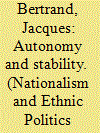

|
|
|
|
|
| Publication |
2014.
|
| Summary/Abstract |
Autonomy is often seen as an institutional instrument to manage substate nationalist conflict. Its implementation is key in determining its impact on conflict. While the central state might be satisfied with the absence of violence and stability as a measure of success, an aggrieved group will view success as gaining new powers and new resources. Autonomy often unravels when different goals are being pursued during implementation. "Special autonomy" in Papua failed because, first, the law was not the product of negotiation but of a solution that the central government imposed; second, Papuans remained divided on its utility and, ultimately, failed to seize the opportunity provided; third, the central government undermined the law in its attempts to curb secessionism, ultimately failing to make it credible.
|
|
|
|
|
|
|
|
|
|
|
|
|
|
|
|
| 2 |
ID:
084036
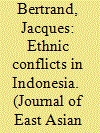

|
|
|
|
|
| Publication |
2008.
|
| Summary/Abstract |
Beginning in the mid-1990s, there was a sudden rise in violent ethnic conflict in Indonesia. Two aspects that require explanation are the timing and clustering of this type of conflict historically. Other studies have not adequately explained these aspects. Methodological and thematic choices have generated problems with identifying and explaining clustering. Microlevel studies fail to account for the broader changes occurring at a macrolevel. Some researchers have chosen to broaden the scope of analysis of violent events to provide explanations of violence more generally. After reviewing these other studies, I argue that a historical institutionalist approach remains best able to explain the clustering of conflicts and the following period of stability. Changing institutional contexts at critical junctures created rising anxieties as well as opportunities to renegotiate group inclusion and status in the Indonesian state.
|
|
|
|
|
|
|
|
|
|
|
|
|
|
|
|
| 3 |
ID:
170972
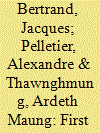

|
|
|
|
|
| Summary/Abstract |
The article argues that “first movers” and the bandwagoning effect they trigger can undermine the dynamics that perpetuate civil war and enable a multiparty cease-fire agreement. It looks at the unprecedented “nationwide” cease-fire in Myanmar reached between the government and several ethnic armed organizations in 2015. It shows that democratization and unilateral concessions by the Myanmar government were instrumental in overcoming the commitment problem and provided the necessary incentives for “first movers” to set the stage for a broad cease-fire agreement.
|
|
|
|
|
|
|
|
|
|
|
|
|
|
|
|
| 4 |
ID:
051245
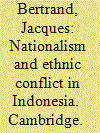

|
|
|
|
|
| Publication |
Cambridge, Cambridge University Press, 2004.
|
| Description |
xxiii, 278p.
|
| Standard Number |
0521524415
|
|
|
|
|
|
|
|
|
|
|
|
Copies: C:1/I:0,R:0,Q:0
Circulation
| Accession# | Call# | Current Location | Status | Policy | Location |
| 048246 | 305.8009598/BER 048246 | Main | On Shelf | General | |
|
|
|
|
| 5 |
ID:
154456
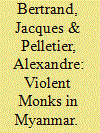

|
|
|
|
|
| Summary/Abstract |
This article seeks to understand why monks played a central role in anti-Muslim violence in transitional Myanmar (2013–2014). We argue that scapegoating is one of many strategies used by monks to gain visibility, to strengthen their autonomous networks, and to increase their social credentials. By analyzing two episodes of monks' participation in religious violence (1930s and 2013–2014), we identify two factors that make scapegoating strategies more likely: (a) decentralized religions foster a multiplicity of organizations and provide incentives for leaders to be entrepreneurial and compete for followers; while (b) the rapid pluralization of the public sphere explains the timing, because it intensifies competition among religious leaders and between religious and secular leaders for social ascendency and power.
|
|
|
|
|
|
|
|
|
|
|
|
|
|
|
|